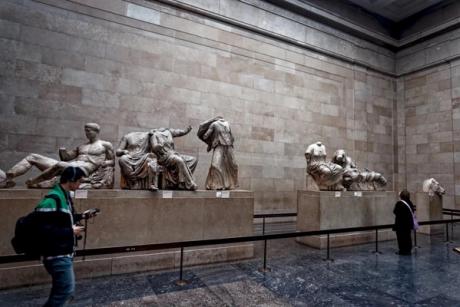
The diplomatic fallout between the UK and Greece has made one thing obvious: for the first time in the long-running dispute over the Parthenon Marbles, Bloomsbury and Westminster seem to be at odds. They had for so long been in lockstep, going back to 1983 when Greece made its first diplomatic claim for restitution. They agreed that the marbles had been lawfully acquired, that they were best situated at the British Museum and that the law forbad their return to Greece. Added to this was the familiar Catch-22: the government said it was a matter for the museum while the museum said that changing the law was up to the government. And so it went… until very recently.
Spurred on by the unexpected openness of its chair, George Osborne, the museum has been in high-level talks with Greek counterparts for the past two years, seeking a solution to the problem that could work for both sides.
It is now clear how such pragmatism is viewed by the UK government, which at best treats it with suspicion. This was evident when the UK’s prime minister, Rishi Sunak, cancelled a meeting with his Greek counterpart in November at the last minute. It could also be seen in the arts minister’s dismissiveness in the House of Lords in December towards any attempt at striking a deal on the marbles. The traditional slogan of “supporting the British Museum trustees” seems to have fallen by the wayside.
This appears to reflect a deeply held belief that any shift in the status quo, no matter how justifiable, is not to be countenanced. An agreement on the marbles, it is felt, could tempt countries everywhere to demand their share of the British Museum, which could eventually bleed the great museum dry. As Michelle Donelan, the then secretary of state for culture, put it last year, to return pieces from museum collections would “open a can of worms” and be a “dangerous road to go down”. Or as the former prime minister Boris Johnson colourfully put it in March: “If you give back the Elgin Marbles to Greece then… above all you have no answer in the years ahead to the theoretical claims for restitution from Egypt and Iraq, Syria, Lebanon, Turkey, Nigeria—everywhere whose treasures are housed in Bloomsbury.”
‘Theoretical claims’ pose no threat
Is this a rational position? It above all reflects a fear of the unknown. One wonders what menace the suggested “theoretical claims” really do pose to those in the corridors of power. Whatever the metaphor used—can of worms, dangerous road, slippery slope—arguments along these lines are almost always fallacious, as they tend to eschew well-established principles of fairness, evidence-based reasoning and common sense.
In the case of the British Museum, even the numbers don’t hold up: the museum has eight million collection objects and, over the past decade, has received fewer than ten restitution requests. The vast majority of the collection was, in any event, legitimately acquired. It boggles the mind how striving to obtain a fair compromise for relatively few morally problematic parts would put the entire stock in jeopardy. And, at any given time, the British Museum can only display around 1% of its collection at its premises.
Seeking a fair resolution on the marbles can hardly be said to open the floodgates. First of all, the marbles are as close to unique a case as possible: it is difficult to think of other pieces as integral to the enduring symbol of one particular nation’s cultural heritage, and where a sculptural scheme has been split in two by the vicissitudes of history. Standalone sculptures, individual paintings and the panels of altarpieces hardly compare. Secondly, any deal negotiated on the marbles would be case-specific, involving a series of loans or similar transfers that would stay within the terms of the British Museum Act 1963. It would hardly inspire a free-for-all.
And, in any event, museums looking to engage on restitution do not operate in a vacuum. They act in an ethical landscape that has developed over the past generation, one which prompts museums to engage openly and fairly with countries of origin. This is reflected in the International Council of Museums (Icom) Code of Ethics and Arts Council England guidance on restitution and repatriation.
An attempt to break through the blockage of the longstanding matter is—and should always be—welcome. It deserves all of our support, even from those on high.
• Alexander Herman is director of the UK-based Institute of Art and Law. He is the author of the book The Parthenon Marbles Dispute: Heritage, Law, Politics (Hart/Bloomsbury, 2023)










